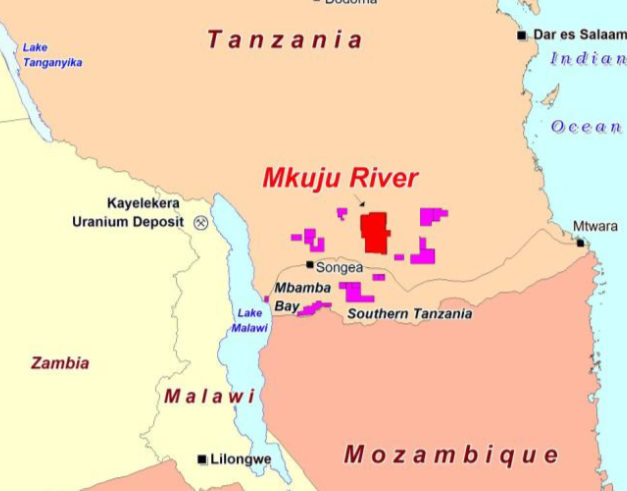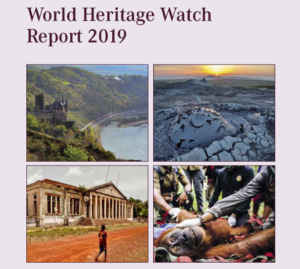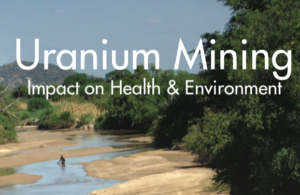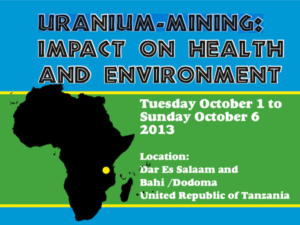TANZANIA: Mkuju River Uranium Project

Tanzanian government welcomed uranium mining as a solution to poverty and economic development, but the capacities to handle side effects like pollution or health risks in terms of laws and regulations are low.
The Selous Game Reserve, covering 50,000 square kilometres, is amongst the largest protected areas in Africa and is relatively undisturbed by human impact.
In 2012, the World Heritage Committee accepted a boundary change of the Selous Game Reserve to allow for uranium exploitation exactly south of the World Heritage Site, in the area of the Selous-Niassa-Wildlife Corridor.
On its June 2014 session, the World Heritage Committee ("WHC") put the Selous Game Reserve on the list of endangered World Heritage sites. We had reported repeatedly about the conflict uranium exploration and plans for uranium mining as well as other exploration activities in the area have caused.
OUR ACTIVITIES
 World Heritage Watch Report 2019:
World Heritage Watch Report 2019:
Tanzania: Selous Game Reserve on Endangered List for four years by 2018 ... and counting
After repeated postponements of the Mkuju River uranium mining project in the Southwest of Selous Game Reserve, the future of the project seems more than questionable: The uranium exploration boom following the 2007 / 2008 rise of the price of uranium has dwindled away within the past years. ROSATOM, Russia’s state nuclear company, had officially announced to postpone the project until 2020, and was officially granted the postponement by the Government of Tanzania. (Günter Wippel, uranium network)
World Heritage Watch Report 2018:
Tanzania: Selous Game Reserve – Still Under Threat
In a February 2017 statement, UNESCO explicitly expressed its concern about Tanzania’s plan to build Stiegler’s Gorge Dam in the central part of Selous Game Reserve. In fact, at the UNESCO WHC Session 2017 in Krakow/Poland, the Tanzanian delegation had requested a postponement of the discussion of WHS Selous Game Reserve due to “new facts”; the request had been granted by the Chair... (Günter Wippel, uranium network)
World Heritage Watch Report 2017:
Tanzania: Selous Game Reserve at Risk Through Unsustainable Developments
For several years, the Government of Tanzania and various companies have pursued plans for major industrial develop- ments inside the World Heritage property, such as the Mkuju River Uranium Project and the Stieglers Gorge and Kidunda dams.
 Uranium Mining - Impact on Health & Environment
Uranium Mining - Impact on Health & Environment
Documentation published by Rosa Luxemburg Stiftung, April 2014
 2013: Conference on Uranium Mining - Impacts on Health and Environment
2013: Conference on Uranium Mining - Impacts on Health and Environment
From October 1 - October 6 2013, experts from around the world gathered in Dar Es Salaam and Bahi to inform the public on the dangers of Uranium Mining. The conference was organized by IPPNW, Uranium Network, LHRC, Rosa Luxemburg Stiftung, NaCUM and CESOPE.
Ist Uranbergbau ein Gewinn für Tansania?
Uranbergbau, Tailings, Folgekosten und Wirtschaftlichkeit: Fakten und Überlegungen zur Wirtschaftlichkeit und wirtschaftlichen Aspekten des Uranbergbaus (powerpoint, April 2012).
NEWS FROM TANZANIA
Magnis Resources steigt in Graphitbergbau in Tansania ein
Informationsblatt zum Nachu Graphite Project in Tansania und der öffentlich-privaten Partnerschaft der WiN Emscher-Lippe GmbH in NRW Aufgrund des niedrigen Uranpreises will Magnis Resources, auch bekannt als Uranex, noch warten, bis das Unternehmen möglicherweise mit der Uranproduktion in Tansania beginnt. Profitabler scheint unter den aktuellen politischen Vorzeichen der Digitalisierung der Graphitbergbau: Graphit ist wesentlicher Bestandteil…
Read MoreTanzanian Civil Society Organisations voice serious concern “REGARDING THE SECURITY OF CITIZENS, HUMAN RIGHTS AND RULE OF LAW IN TANZANIA”
On 21. Feb. 2018, 110 Tanzanian Civil Society (CSOs) organisations published a brief report on the Human Rights situation in Tanzania, listing some shootings and disappearances as examples as well as other occurrences: “These incidents includes armed attacks, atrocious killings, injuries, enforced disappearance, brutality, arrests, malicious prosecutions targeting human rights defenders (HRDs), journalists, politicians and…
Read More“Es ist ein Alptraum, wenn ein Bergbauunternehmen ins Dorf kommt”
Tansania ist reich an Bodenschätzen, ihr Export einer der wichtigen Devisenbringer. Pläne zum Uranabbau wurden wegen des niedrigen Weltmarktpreises für Uran zwar verschoben – nicht jedoch die Vorbereitungen. Indes verschärft das tansanische Parlament mit Präsident John Magufuli die Auflagen für Verträge mit ausländischen Firmen. Eine Atempause für Aktivisten, die den Uranabbau zu verhindern versuchen, ist…
Read MoreTanzania: Opposition MP Tundu Lissu wounded by gunmen / Tansania: Spitzenpolitiker und Regierungskritiker Tundu Lissu niedergeschossen
Tanzanian opposition lawmaker Tundu Lissu, a fierce critic of President John Magufuli’s government, was seriously wounded in a gun attack on Thursday, police and party officials said. Human rights groups condemned the shooting as a “cowardly attack”. Tundu was active in Human Rights issues and critical of the extractive industries based on his experiences; in…
Read MoreRosatom will freeze uranium project in Tanzania for at least three years
“Rosatom State Corporation, which planned to start mining uranium at the Mkuju River mine in southern Tanzania in 2018, decided to postpone the development of the project until the demand for uranium is restored, which is expected not earlier than 2020” (Traslated from Russian via google tranlsate) read the article
Read MoreA chairperson from uranium-network.org and a representative from LHRC
A chairperson from uranium-network.org and a representative from LHRC – Legal and Human Rights Center, Dar es Salaam, Tanzania, speak out about the impacts of planned Mkuju River Uranium Project on the Outstanding Universal Value (OUV) of World Heritage Site Selous Game Reserve in Tanzania. The uranium mining project, operated by local company Mantra, owned…
Read MoreEin Stop für (Uran-)Bergbau im Selous Game Reserve?
Artenschutz in Afrika – Hilferuf der Wildnis Es ist eines der größten Naturreservate der Welt: das Selous in Tansania. Jetzt drohen Wilderei, Uranminen und ein Staudamm, die Region für immer zu zerstören. Wie können die Tiere und der Busch überleben?” Artikel lesen
Read MoreMalawi set up 8 Tanzanian Environmentalists and detains them arbitarily since more than 2 months
The court proceedings in the case of Malawi against 8 Tanzanian environmental defenders have shown without doubt that the 8 persons detained had been lured into a trap set up by Malawi authorities, they were then arrested under the pretense of “trespassing”; 5 Malawian accompanyiing them, arrested at the very same spot, were set free…
Read MoreREPORT on the continuation of court case against 8 Tanzanians detained in Malawi, on 13. and 14. February 2017
As we had suspected earlier, the 2 days of continuation of the court proceedings on 13 and 14 February 2017 in Karonga, Malawi, revealed the complete ‘framing’ of the Tanzanian group of 8 environmentalists and farmers visiting Malawi in December 2016 to learn more about uranium mining and its impacts. Definitely, steps had been taken…
Read MoreTanzania civil society organisations call for protection of Selous GAme Reserve, oppose uranium mine
“Tanzanian civil society organisations (CSOs) working in the areas of human rights, natural resources accountability and wildlife conservation, call on the World Heritage Committee to stand in solidarity with CSOs by acting on protection of the World Heritage Site. The nine NGOs state that ” … prospecting mining companies also substantially contribute to the ongoing…
Read MoreWHC declares Selous Game Reserve endangered World Heritage site
On its June 2014 session, the World Heritage Committee (“WHC”) put the Selous Game Reserve on the list of endangered World Heritage sites. We had reported repeatedly about the conflict uranium exploration and plans for uranium mining as well as other exploration activities in the area have caused.
Read MoreStudy: “Uranium Mining – Impact on Health and Environment” info brochure
via [umweltfairaendern]: The Rosa Luxemburg Stiftung East Africa Office has published a study in cooperation with LHRC Tanzania. The study includes forewords by Dr. Helen Kijo-Bisimba (LHRC) and Dr. Robert Mtonga (IPPNW). Also included is the opening speech of the Dar es Salaam conference in October 2013. The articles touch general topics around health, environment,…
Read MoreDeutsche Welle on Uranium exploitation in Tanzania
“Though many consider the risks incalculable, Tanzania is planning to mine its radioactive uranium. A history of gold mining shows that the country, its people and abundant wildlife stand to gain little from doing so.” Read the whole article at Deutsche Welle.
Read MoreUranium ore tempts Tanzania to dig dangerously
“Though many consider the risks incalculable, Tanzania is planning to mine its radioactive uranium. A history of gold mining shows that the country, its people and abundant wildlife stand to gain little from doing so.” Read the whole article at Deutsche Welle.
Read MoreExperts still concerned about dangers of uranium mining
Press coverage on the results of the Bahi Conference, by David Kisanga.
Read MoreThe Mkuju Uranium Project is far from being “on track”
A response to the Daily News Article “Mkuju uranium project on track, says Mantra”. The fact that MANTRA launched this article – referring to that February conference which is already OLD, outdated news – may be a direct consequence of our activities – MANTRA may feel they have to ‘affirm’ THEIR project.
Read MoreKonferenz gegen Uranabbau in Tansania: Field Trip Report
Unter den internationalen Teilnehmern sind Mitglieder des Vorstandes von IPPNW Schweiz, IPPNW Deutschland und IPPNW Holland, der Rosa-Luxemburg-Stiftung Tansania, Falea 21–Bewegung Frankreich und der NGO Robin Wood Deutschland.
Read MoreConference against Uranium mining in Tanzania: Field trip to Bahi
By Gudrun Conrad (German Version) September 30th, 2013. Most participants of the international conference have arrived at Dar Es Salaam. Among the international attendees are members of IPPNW Germany and Netherlands, the Rosa-Luxemburg- Foundation Tanzania, Falea 21-movement France and the NGO Robin Wood Germany.
Read MoreJoint statement of the participants of the conference on “Uranium Mining – Impact on Health and Environment” in Dar-Es-Salaam
[08.10.2013] We representatives of civil society organisations gathered here in the multi–stakeholder conference “Uranium Mining – Impact on Health and Environment” have prepared a statement highlighting our concerns on the uranium industry.
Read MorePress Release: Uranium Mining Conference Dar Es Salaam
[04.10.2013] The International Physicians for the Prevention of Nuclear War (IPPNW) in cooperation with the uranium-network.org Germany, the Rosa Luxemburg Foundation (East Africa Office) and the Tanzanian organisations LHRC, CESOPE and NaCUM. Topic: “Uranium Mining – Impact on Health and Environment”.
Read MoreInternational conference against uranium mining – visiting Manjoni, Dodoma and Bahi
[04.10.2013] International Conference participants visited Manjoni and Bahi, where test drills for uranium mining have been conducted – right where people send their cattle and grow rice. In the evening, a social event was held in Dodoma to celebrate and collaborate against the destruction of lives and culture by possible uranium exploitation.
Read MoreInternational Conference against uranium mining in Bahi
[01.10.2013] The international conference in Tanzania has started. Today, the activists are going to travel to Bahi, where mining companies Mantra Ressource und Uranex have been reported doing test drills on the local Uranium deposits. Tomorrow, activists from all over the world will share thoughts, facts and opinions at the conference.
Read MoreUranium Mining: Impact on health and environment – Conference in Dar Es Salaam and Bahi, October 1st-6th
The demand for uranium, the fuel for nuclear power plants and nuclear bombs, creates an apparent need for more mining operations. For this reason and because of insufficient local regulations, uranium-mining companies are increasingly focusing on African countries.
Read MoreStatement re: Mkuju River Uranium Project and Selous Game Reserve Word Heritage site.
In July 2012, the World Heritage Committee, chaired by Ms. Mitrofanova from Russia, had made a decision to accept the application of the Government of Tanzania for a “minor boundary change” of World Heritage site Selous Game Reserve (SGR), in order to allow a uranium mining project, Mkuju River Project to go ahead under conditions…
Read MoreGEO on the Selous problem
A German article by GEO on the Selous problem: Uranabbau im Selousreservat?
Read MoreLHRC urges protection of public from uranium hazards
The Tanzanian government has been advised to put in place a policy, laws and regulations that show how the public, especially those living around uranium mining areas, will be protected against uranium hazards.
Read MoreTanzania launches probe on ‘uranium dust’ rumors
Tanzania has launched a special team of experts to work on rumors that Tanzanian farmers in northern part of the country are using uranium dust as pesticides to preserve cereals and agricultural produce…
Read MoreCall for care in uranium exploration, extraction
German experts yesterday urged the government to exercise maximum care in uranium exploration and extraction to ensure the mineral does not affect people’s health.
Read MorePress Release Re: World Heritage Comittee Decision on Selous Game Reserve Boundary Changes
[30.07.2012] Elephants, Rhinos and the environment under threat from 60 million tons of radioactive waste as World Heritage Committee agrees boundary change that will allow uranium mining at the Tanzania Selous Game Reserve – a World Heritage site.
Read MoreUranium Mining – what does it mean for Tanzania?
by Civil Education is the Solution to Poverty and Environmental Management (CESOPE), Foundation for Environmental Management and Campaign against Poverty (FEMAPO) and Uranium-network.org c/o Menschenrechte 3000. Download/View PDF
Read MoreTanzanian churches oppose uranium mining (Article)
by Fredrick Nzwili in Ecumental News International 18 June (ENInews)–Protestant churches in Tanzania have cautioned the government against extracting uranium deposits recently discovered in the East African country, noting that Germany plans to close its nuclear power stations by 2022 and the Japanese city of Fukushima is still recovering from the 2011 earthquake-caused nuclear disaster.…
Read MoreAction for the preservation of the Selous Game Reserve in Tanzania (Report enclosed)
Uranium-network.org has published a detailed report on the situation in the Selous Game Reserve in Tanzania, concerning the planned Mkuju River Uranium Project. The UNESCO world heritage center soon decides on the requested change of boundaries. If that change goes through, the uranium mine will be built, directly nearby the worlds largest remaining wild elephant…
Read MoreLetter to the WHC, IUCN and WCPA concerning Selous Game Reserve
This letter is directed to experts within WHC, IUCN and WCPA. It concerns itself with the Tanzanian motion on a Minor Boundary Modification of the Selous Game Reserve. Download/View PDF
Read MoreAnschreiben an die deutsche UNESCO Delegation betreffs Selous Game Reserve
Anschreiben an die deutsche UNESCO Delegation, betreffend die beantragte “geringfügige” Grenzänderung des Selous Game Reserve. Download/View PDF
Read MoreConcerning the Mkuju River Uranium Project at Selous Game Reserve, Tanzania
Attached is an important letter from the Gundjeihmi Aboriginal Corporation to all members of the WHC and the director of the world heritage centre. Please share this letter through any channels you have access to, and sign the petition linked below, it’s very important to make an impression in this matter.
Read MoreBeyond Nuclear & Uranium Network: Stop the Mkuju River Uranium Project at Selous Game Reserve, Tanzania
Important Petition: Sign this and tell your friends! The World Heritage site Selous Game Reserve in Tanzania faces a possible change of boundaries because of the planned Mjuku River uranium mine.
Read MoreIst Uranbergbau ein Gewinn für Tansania?
April 2012 / Günther Wippel, Martin Kurz Fakten und Überlegungen zur Wirtschaftlichkeit und wirtschaftlichen Aspekten des Uranbergbaus Bei der Beurteilung von Projektes des Uranbergbaus werden häufig die wirtschaftlichen Vorteile sowie die Steuer- und Pachteinnahmen für den Staat als Vorteile hervorgehoben. Der Uranbergbau zieht jedoch aufgrund der physikalischen, chemischen und geologischen Gegebenheit sowie der allgemeinen…
Read MoreSelous Game Reserve – World Heritage site und geplanter Uranabbau am Mkuju River Project / Factsheet Februar 2012
Der Selous Game Park (Wildreservat Selous) liegt im Süden von Tanzania, er umfasst 50.000 km², das sind rund 5% des Staatsgebietes. Er ist damit das größte kontrollierte Wildschutzgebiet in Afrika. Der Park beherbergt – neben vielen andere Tierarten – bedeutende Populationen von Elefanten, dem Schwarzen Nashorn, Geparden, Giraffen, Flusspferden und Krokodilen und Wildhunden. Man kennt…
Read MoreDie Senke von Bahi – eine Oase des Lebens bedroht durch Pläne zum Uranbergbau / Factsheet Februar 2012
Etwa 50km westlich der tansanischen Hauptstadt Dodoma erstreckt sich um die Kleinstadt Bahi ein topfebenes Tiefland. Ausläufer des ostafrikanischen Grabenbruchs leiten sowohl ober- als auch unterirdisch abfließendes Wasser in diese abflusslose topographische Senke (1).
Read MoreFact-finding Mission betreffs Uranabbau in Tanzania
Tanzania: Dar Es Salaam / Bahi / Dodoma Ute Koczy (MdB, Die GRÜNEN) und Jüttner (MdB, CDU) in Tanzania Fact-finding Mission betreffs Uranabbau siehe Bericht auf der website der GRÜNEN
Read MoreAllgemeine Situation
Ein kurzer Überblick zur Situation in Tanzania.
Read MoreUranium mining in the eyes of civil society in Tanzania
Kurzversion einer Präsentation von Anthony Lyamunda während des von Tanzania-network.de e.V. veranstalteten Studientages zum Thema „Gold, Uran und Edelsteine – Wie reich ist Tansania wirklich?“ (english translation included)
Read MoreA Golden Opportunity? How Tanzania is falling to benefit from Gold Mining
A Golden Opportunity – Justice and Respect in Mining Download complete text as PDF
Read MoreImminent Uranium Mining in Tanzania
Currently 25 companies from different countries are exploring for uranium in Tanzania (www.wiseuarnium.org). Already in the 1970s radiometric survey showed several radiometric anomalies pointing to uranium enrichments as well in the South of Tanzania as in an area around Bahi in central Tanzania. During the last years these possible deposits got into the focus of…
Read More